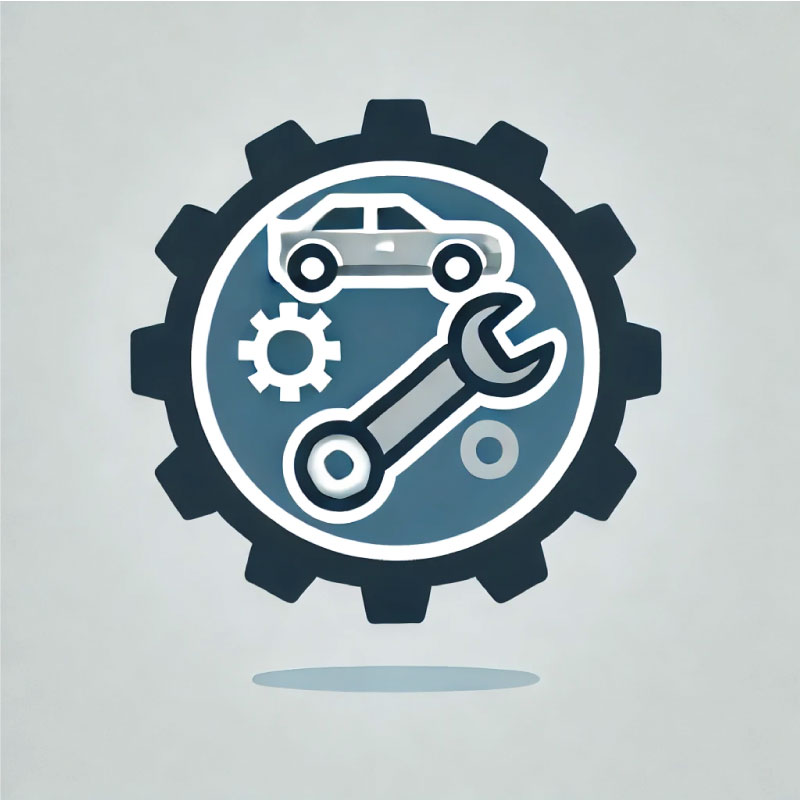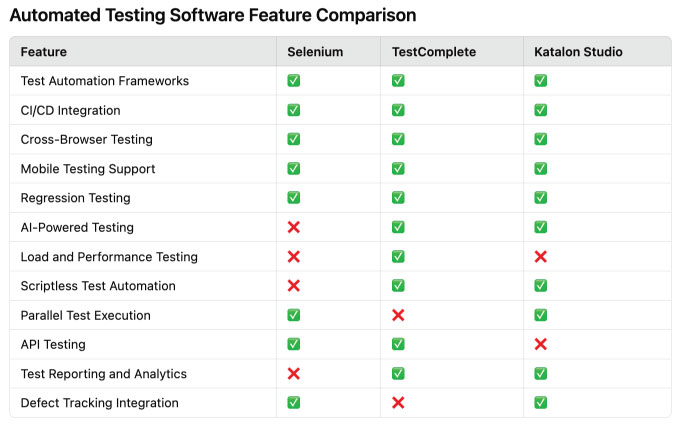Automated Testing Software enables developers and QA teams to efficiently verify software functionality, performance, and security. By automating repetitive testing processes, these tools reduce human error, accelerate development cycles, and improve software reliability. Over time, automation has evolved from simple script-based tools to AI-powered platforms that self-heal and adapt to changes in code.
Notable automated testing tools include Selenium, Appium, TestComplete, JUnit, and Katalon Studio.
This category is closely related to Continuous Integration Software, Bug Tracking Software, and Software Development Tools.

Selenium – An open-source framework for automating web applications across different browsers and platforms. It supports multiple programming languages, including Java, Python, and C#, and integrates seamlessly with CI/CD pipelines.
TestComplete – A commercial, script-based and scriptless test automation tool that supports web, desktop, and mobile applications. It offers AI-driven object recognition, keyword-driven testing, and integration with popular defect-tracking tools.
Katalon Studio – A low-code automation platform designed for web, API, mobile, and desktop testing. It features built-in test management, parallel execution, and AI-powered self-healing test scripts to reduce maintenance.
Appium – An open-source mobile automation framework that enables testing of iOS and Android applications using the WebDriver protocol. It supports multiple programming languages and real-device testing, making it ideal for mobile-first development teams.
JUnit – A lightweight Java-based framework primarily used for unit testing in test-driven development (TDD). It supports assertions, annotations, and test runners, making it a popular choice for Java developers.
Postman – A robust API testing and development tool that allows users to automate API requests, validate responses, and create end-to-end API test collections. It supports scripting with JavaScript and integrates with CI/CD workflows.
JMeter – A performance and load testing tool used to analyze system scalability and response times under high user loads. It supports various protocols, including HTTP, FTP, and WebSockets, and integrates with cloud-based testing environments.
Cypress – A JavaScript-based end-to-end testing framework optimized for modern web applications. It offers real-time debugging, built-in wait mechanisms, and an intuitive interface for front-end developers.
Ranorex – A commercial GUI test automation tool for desktop, web, and mobile applications. It provides codeless test creation, image-based automation, and detailed reporting, making it suitable for non-technical testers.
LambdaTest – A cloud-based cross-browser testing platform that enables parallel execution on over 3,000 browser and OS combinations. It integrates with popular automation frameworks like Selenium and Cypress for scalable testing.
The table below compares key features of three popular automated testing tools: Selenium, TestComplete, and Katalon Studio. This comparison highlights their strengths and limitations to help teams select the right solution.

The feature comparison table highlights the strengths and trade-offs of Selenium, TestComplete, and Katalon Studio in automated testing. Selenium stands out as a free and flexible framework, ideal for web automation and CI/CD integration, but lacks built-in AI-powered testing, scriptless automation, and advanced reporting. TestComplete offers a comprehensive commercial solution with strong support for scriptless automation, AI-powered testing, and performance testing, but it lacks parallel execution and seamless defect tracking integration. Katalon Studio provides a balanced mix of features, including mobile and web testing, scriptless automation, and CI/CD support, though it falls short in API testing and load testing compared to the others.
Choosing the right tool depends on your needs: Selenium is great for skilled developers who need customization, TestComplete is best for enterprises wanting a full-featured solution, and Katalon Studio offers an accessible option with both codeless and script-based testing.
This video, “What is Automated Testing? Beginner Intro & Automation Demo,” provides a clear and practical introduction to test automation. You’ll learn the fundamental concepts behind automated testing, see how it compares to manual testing, and watch a live demo of automation in action.
By watching this video, you’ll gain insight into:
✅ What automated testing is and why it’s essential for software development
✅ How automation improves testing efficiency, accuracy, and scalability
✅ A step-by-step demonstration of an automation tool in use
✅ Key factors to consider when choosing the right automated testing software
This video is especially helpful if you’re trying to select the best automation framework or testing tool for your team. After watching, you’ll have a better understanding of whether open-source tools like Selenium or Appium, or commercial platforms like TestComplete and Katalon Studio, might be the best fit for your needs.
This example dashboard provides a comprehensive view of automated testing results, helping QA engineers and developers monitor software quality efficiently. The interface is designed for clarity and usability, featuring key testing metrics and real-time insights.
This dashboard serves as a central hub for test automation, providing actionable insights to improve software stability and accelerate development cycles.

Automated Testing Software comes with a range of features that optimize software quality assurance. From traditional script-based automation to AI-driven self-healing tests, these tools provide comprehensive testing solutions. Features like parallel execution, cross-platform compatibility, and API testing help teams release software faster while ensuring quality. Below, we’ll explore these key features in detail.
Automated testing tools provide frameworks that offer a structured environment for executing test scripts. These frameworks, such as Selenium WebDriver, JUnit, and TestNG, establish standardized testing practices, improve test reusability, and ensure scalability.
Modern software development relies on continuous integration and continuous deployment (CI/CD) pipelines. Automated testing software integrates with CI/CD tools like Jenkins, GitHub Actions, and Azure DevOps to trigger automated test runs upon new code commits, ensuring rapid feedback loops.
With multiple web browsers in use, ensuring compatibility is crucial. Automated testing tools like Selenium and BrowserStack validate how applications behave on Chrome, Firefox, Safari, and Edge, helping developers fix inconsistencies before deployment.
Automated testing software supports mobile application testing on Android and iOS platforms. Tools like Appium and Espresso simulate real-device conditions, helping developers ensure app stability across various devices.
Every software update risks breaking existing features. Automated regression testing re-executes previously successful test cases to catch new defects. This ensures that past functionalities remain intact after updates.
AI and machine learning enhance automated testing by optimizing test coverage and reducing script maintenance. AI-driven tools like Testim and Applitools self-heal test scripts and identify anomalies, improving test efficiency.
Performance testing tools simulate high user traffic to evaluate an application’s responsiveness and stability under heavy load. Popular tools like JMeter and LoadRunner identify bottlenecks before real users experience them.
Many modern testing platforms offer low-code or scriptless automation, allowing users to create and execute tests without writing code. Tools like Katalon Studio and TestProject cater to non-technical users, making test automation accessible to broader teams.
Parallel test execution allows multiple tests to run simultaneously, significantly reducing testing time. Cloud-based testing services like Sauce Labs and LambdaTest provide infrastructure for executing tests concurrently across different environments.
Automated testing software includes features to validate API endpoints, ensuring they return expected responses and handle errors correctly. API testing tools like Postman, RestAssured, and SoapUI streamline backend testing.
Comprehensive reporting dashboards and analytics tools help teams monitor test results, track trends, and identify problem areas. Advanced solutions provide real-time insights and integrate with platforms like TestRail and Allure for test management.
Automated testing tools often integrate with issue-tracking systems like JIRA, Bugzilla, and Trello, allowing developers to log and resolve detected issues seamlessly.
Automated testing software is a tool that executes pre-defined test cases without manual intervention, ensuring software quality and reliability.
Automated testing executes tests via scripts, improving efficiency, while manual testing requires human effort to validate functionality.
It accelerates testing, reduces errors, improves accuracy, and allows for continuous testing in CI/CD environments.
Industries such as software development, banking, healthcare, and e-commerce rely on automated testing to ensure software quality.
No, manual testing is still needed for exploratory, usability, and ad-hoc testing scenarios.
Selenium is a popular open-source choice for web automation, but other tools may offer better features for specific needs.
AI enhances test automation by optimizing test coverage, reducing maintenance, and detecting anomalies.
It allows users to create tests without writing code, making automation accessible to non-programmers.
Automated tests ensure new code changes don’t break existing functionality, enabling continuous deployment.
The cost of automated testing software varies widely depending on the tool, licensing model, and features offered.
Selenium is completely free and open-source, making it a popular choice for teams with strong programming expertise. However, additional costs may arise from setting up testing infrastructure, integrating third-party reporting tools, or using cloud-based testing platforms.
TestComplete is a commercial tool with pricing starting at $2,256 per year per user for the base edition, with higher-tier plans offering additional features like AI-powered object recognition and mobile testing.
Katalon Studio offers a free version with basic automation features, while its premium plans start at $1,699 per year per user, providing enhanced test management, AI-powered self-healing scripts, and advanced analytics.
Appium is another free open-source option but, like Selenium, requires additional infrastructure setup, which can lead to costs if using cloud-based device farms like Sauce Labs or BrowserStack.
Postman has a free tier for individual users, while team-based plans start at $14 per user per month, offering API automation, collaborative features, and enterprise integrations.
LambdaTest, a cloud-based cross-browser testing tool, offers pricing starting at $15 per month for individual users, with enterprise plans costing upwards of $99 per month, depending on usage and parallel testing requirements.
Teams should consider not only the base licensing cost but also hidden expenses such as infrastructure, support, training, and third-party integrations when selecting an automated testing solution.